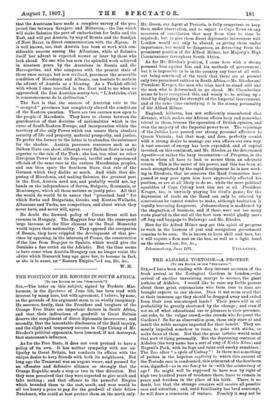THE POSITION OF MR. RHODES IN SOUTH AFRICA.
[To THE EDITOR OF THE " SPECTATOR:9 SIR,,—The letter on this subject, signed by Frederic Mac- karness, in the Spectator of June 5th, has been read with interest by many here, but with agreement, I believe, by none, as the grounds of his argument seem to us wholly imaginary. He assumes, firstly, that the President and burghers of the Orange Free State are important factors in South Africa, and that their indications of goodwill to Great Britain deserve the compliment of direct diplomatic intercourse; and secondly, that the lamentable disclosures of the Raid inquiry, and the slight and temporary success in Cape Colony of Mr. Rhodes's political opponents, have lessened, if not destroyed, that statesman's influence.
As for the Free State, it does not even pretend to have a policy of its own. It has neither sympathy with nor an- tipathy to Great Britain, but conducts its affairs with the unique desire to keep friends with both its neighbours. Not long ago the Transvaal was an urgent wooer, and pressed for an offensive and defensive alliance so strongly that the Orange Republic made a step or two in that direction. But they soon perceived that they were expected to give much and take nothing ; and that offence to the powerful Empire which bounded them to the east, south, and west would be all too heavy a price to pay for the goodwill of their fellow Dutchmen, who could at best protect them on the north only. Mr. Green, our Agent at Pretoria, is fully competent to keep them under observation, and to report to Cape Town on any measures of conciliation that may from time to time be required ; but to give them direct diplomatic intercourse with London would not only be absurd, as giving them undue importance, but would be dangerous, as detracting from the prominent position of Sir Alfred Milner, her Majesty's High Commissioner throughout South Africa.
As for Mr. Rhodes's position, I came here with a strong personal bias against him and his methods of government ; but it is impossible to be in the country any time at all with- out being convinced of the truth that there are at present only two prominent entities in South Africa,—Mr. Rhodes and President Kruger, the man who tries hard to stand still and the man who is determined to go ahead. Mr. Chamberlain seems to have recognised this, and wisely to be setting up a third by displaying the strength of the Imperial Government, and at the same time embodying it in the strong personality of Sir Alfred Milner.
England, hitherto, has not sufficiently remembered that distance, which makes our African affairs hazy and somewhat trivial to them, lessens the operation of British opinion, and even the majesty of the Imperial power to us. The rejoicings of the Jubilee have proved our strong personal affection to Queen Victoria; but that may, and does, perfectly coexist with a strong desire to manage our own affairs our own way. A vast amount of energy has been expended, and of capital invested, on this continent, and Mr. Rhodes, as the determined Apostle—or rather the hazy incarnation—of Progress, is the man to whom all have to look to secure them an adequate return. This is the secret of his power, and this has been so much strengthened by the rapid development he is now work- ing in Rhodesia, that no censures the Raid Committee have passed or may pass upon him have appreciably affected his position, or are at all likely to do so ; while the mere political squabbles of Cape Colony hurt him not at all. President Kruger, too, is unwisely playing his rival's game; for the depression of trade on the Rand can only be relieved by concessions he cannot resolve to make, although hesitation is rapidly becoming dangerous. Johannesburg is maddened by the stagnation of business, and if there were not too many roots planted in the soil all the best men would gladly MOV2 off bag and baggage to Bulawayo and Mr. Rhodes.
How far Sir Alfred Milner may get this spirit of progress to work in the harness of just and scrupulous government remains to be seen. He is known to have skill and tact, but it will require a firm seat on the box, as well as a light hand on the reins.—I am, Sir, Sw.,


































 Previous page
Previous page